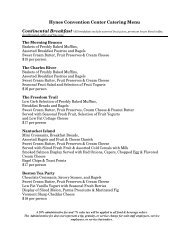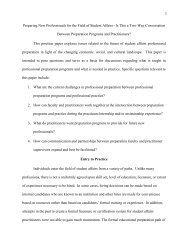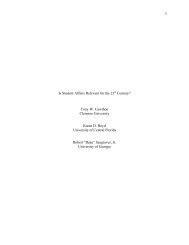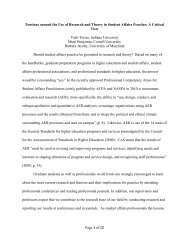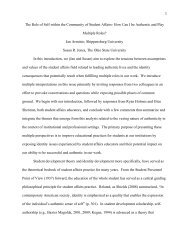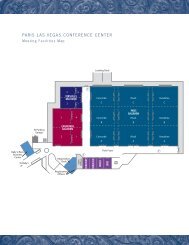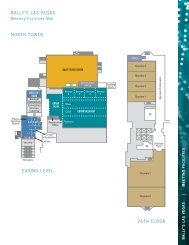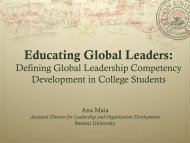Dear ACPA Colleagues: - ACPA 2014 Indianapolis Convention
Dear ACPA Colleagues: - ACPA 2014 Indianapolis Convention
Dear ACPA Colleagues: - ACPA 2014 Indianapolis Convention
You also want an ePaper? Increase the reach of your titles
YUMPU automatically turns print PDFs into web optimized ePapers that Google loves.
Additional Presenters: Mary Ball, John<br />
Carroll University; Mary Beth Javorek, John<br />
Carroll University<br />
The death of a college student can profoundly<br />
impact a campus community and represents<br />
one of the most challenging situations a<br />
student affairs professional may face. Presenters<br />
will talk candidly about lessons learned<br />
on a small private campus that experienced<br />
two student suicides during a six-week time<br />
period. Best practices for responding to a<br />
student death will be discussed including:<br />
communication issues, the impact of social<br />
media, and immediate as well as long-term<br />
support for the campus community.<br />
1068 Beyond Advice: Using<br />
Nonviolent Communication to<br />
Promote Self Authorship<br />
Student Learning and Development;<br />
Advising and Helping<br />
Location: Baltimore <strong>Convention</strong> Center, 314<br />
Program Presenter: Jennie Cisar Lawrence,<br />
Ohio State University<br />
Additional Presenters: Jennifer Robb, Ohio<br />
State University<br />
Founded on principles of increasing connection<br />
and reducing conflict, nonviolent communication<br />
(NVC) offers tools to help individuals<br />
identify underlying needs that drive<br />
their actions. NVC techniques have informed<br />
many efforts for change, including negotiating<br />
cease fires and reforming K-12 education.<br />
Applicable to student development, NVC<br />
teaches us to address student feelings and<br />
needs, provide empathy, and help students<br />
clarify their voices while journeying to self<br />
authorship. This session will introduce NVC<br />
and teach techniques to apply it to higher<br />
education.<br />
1069 When Racism and Sexism<br />
Collide: Common Dynamics and<br />
Lessons Learned<br />
Equity, Diversity, and Inclusion<br />
Sponsored Program<br />
Location: Baltimore <strong>Convention</strong> Center, 348<br />
Program Presenter: Kathy Obear, Social<br />
Justice Training Institute<br />
Additional Presenters: Jamie Washington,<br />
Social Justice Training Institute; Vernon Wall,<br />
Social Justice Training Institute<br />
Too often strategic plans for creating inclusive<br />
campus communities fall short due to<br />
interpersonal conflicts among key campus<br />
leaders. A common place where misunderstanding<br />
and triggering events occur is<br />
between white women and men of color.<br />
Come explore the predictable dynamics and<br />
pitfalls while we identify crucial steps and<br />
tools for creating true partnerships for creating<br />
systemic, sustainable change.<br />
1070 The Importance of<br />
Energy Management for<br />
Student Affairs Educators<br />
Personal Foundations<br />
Location: Baltimore <strong>Convention</strong> Center, 315<br />
Program Presenter: Peter Athans, The<br />
United States Military Academy at West Point<br />
(Army)<br />
Our abilities to manage and utilize our mental,<br />
physical, and emotional energy greatly impacts<br />
success in our personal and professional<br />
lives. To live up to our potential, it is imperative<br />
that we tend to both our mind and body.<br />
For many of us, our energy is misguided<br />
or lost due to a great disparity between our<br />
intentions and actions. This session will<br />
explore this disparity and provide tools and<br />
techniques on how we can overcome our selfimposed<br />
energy management obstacles.<br />
1071 Parents as Partners:<br />
Innovative Assessment to<br />
Evaluate Parent Orientation<br />
Programs<br />
Evidence and Improvement;<br />
Assessment, Evaluation, and Research<br />
(AER)<br />
Location: Baltimore <strong>Convention</strong> Center, 345<br />
Program Presenter: Jaime Blanton,<br />
University of North Texas<br />
Additional Presenters: Stella Mulberry Antic,<br />
University of North Texas<br />
Parent involvement is an increasingly<br />
important indicator of student success,<br />
satisfaction, and retention. But incorporating<br />
parents into the college transition is a delicate<br />
balancing act. Gauging the effectiveness of<br />
parent orientation efforts requires careful,<br />
comprehensive assessment. This session will<br />
share how the Division of Student Affairs at<br />
a large, public university planned, executed,<br />
and evaluated their 2010 parent orientation<br />
evaluation. Survey results, instruments, and<br />
analysis methodology will also be shared.<br />
1072 Stop Running From<br />
Statistics: Help for the<br />
Statistically Challenged<br />
be more<br />
Evidence and Improvement;<br />
Assessment, Evaluation, and Research<br />
(AER)<br />
Location: Baltimore <strong>Convention</strong> Center, 349<br />
Program Presenter: Kimberly Yousey-<br />
Elsener, StudentVoice<br />
Do the words reliability, validity, statistical<br />
differences, correlation, t-test, and others<br />
cause you to want to run away? Have no<br />
fear; statistical concepts are often easier to<br />
understand than you may think. This session<br />
focuses on helping you understand statistics<br />
so that you may have an informed conversation<br />
about your assessment results or the latest<br />
research article you read. It will not focus<br />
on how to run statistics, but provides with<br />
you resources to help you take this next step.<br />
1073 Using Assessment-Based<br />
Training to Help RAs B’More<br />
Evidence and Improvement;<br />
Assessment, Evaluation, and Research<br />
(AER)<br />
Location: Baltimore <strong>Convention</strong> Center, 342<br />
Program Presenter: Tim Cherney, Loyola<br />
University Maryland<br />
Additional Presenters: Ivan Ceballos, Jr.,<br />
Loyola University Maryland<br />
Too often assessment of RA training<br />
programs is reduced to satisfaction surveys.<br />
When developers establish a consistent set<br />
of learning outcomes and assessment<br />
techniques, training programs can be drastically<br />
improved. Participants will leave this<br />
session with a basic understanding of how to<br />
write learning outcomes, use data to enhance<br />
training components, and incorporate<br />
creative approaches to assessment including<br />
knowledge and confidence evaluation, technology,<br />
observation of role-play scenarios,<br />
and case studies.<br />
1074 Tools for Student<br />
Success: Integrating Social<br />
Class in Counseling<br />
Student Success; Equity, Diversity, and<br />
Inclusion<br />
Location: Baltimore <strong>Convention</strong> Center, 320<br />
CEs: 1<br />
Program Presenter: Joy Stephens, Towson<br />
University<br />
Latest <strong>Convention</strong> updates on twitter, @aCpa<strong>Convention</strong> or http://<strong>Convention</strong>.myaCpa.org/sCheduLe 131<br />
Wednesday, March 30





